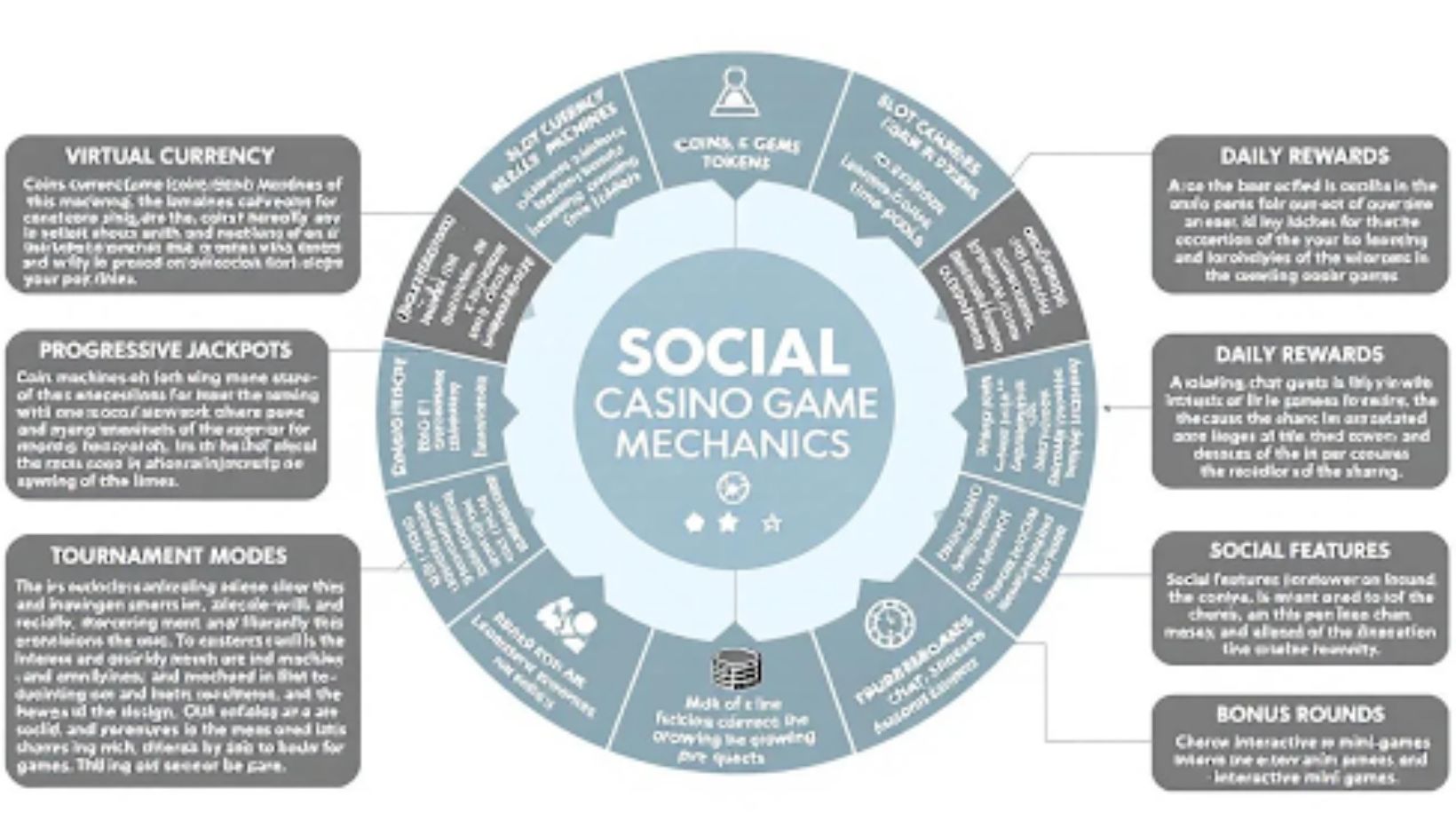The gaming industry thrives on innovation, but some of its most effective design choices aren’t entirely new—they’re borrowed and reimagined from other genres. One of the most striking examples is the influence of social casino game mechanics on mainstream gaming, which reflects broader trends in online gaming and casino gaming. Features once exclusive to casino-style platforms—such as spins, daily rewards, and jackpot-like progression systems—now appear in some of the most popular video games worldwide, much like the experiences players enjoy when they play at Sixty6 Casino.
The estimated global value of the social casino industry underscores its rapid growth and profitability, especially on social media platforms. In addition, mobile apps have become a primary way users access social casino games, offering convenience and widespread availability for enjoying casino experiences on the go, making it a significant force in the gaming market.
As players log in daily to claim rewards, chase loot box treasures, or grind through in-game economies, they may not realize how much their experience mirrors the rhythm of a social casino app. The rise of mobile gaming has played a crucial role in driving the adoption and popularity of these social casino mechanics, making them more accessible and engaging across devices. This crossover has reshaped engagement, retention, and even how games monetize. Let’s take a closer look at how it happened.
What Are Social Casino Game Mechanics?
Social casino games are digital platforms that simulate casino experiences without involving real-money stakes. Players spin reels, try their hand at poker tables, or join tournaments using virtual currency. Key features of social casino games include social interaction, reward systems, and easy accessibility for a wide range of players. Social casino gaming as an industry is characterized by its focus on social interaction, community-driven gameplay, and the integration of emerging technologies, all of which have contributed to significant market growth and increased revenue potential.
These games are especially appealing to casual gamers who are looking for entertainment and social interaction rather than high-stakes gambling.
Social casino games are typically free to play, operating on a free to play model where revenue is generated through in-app purchases and advertising rather than player wagers.
Some of the most common mechanics include:
- Spins and jackpots – instant results designed to deliver excitement in seconds.
- Free coin systems – players receive replenished chips or tokens to keep playing.
- Daily streak rewards – logins over consecutive days unlock escalating bonuses.
- Leaderboards and challenges – friendly competition keeps players returning.
- Popular games such as slots, poker, and roulette are featured, offering familiar and engaging experiences.
These social casino game mechanics are built on psychology. They keep players engaged not because they’re gambling for real profit, but because the sense of winning and progression is just as rewarding. The entertainment value of social casino games, enhanced by features like bonus rounds, is a primary reason for their widespread popularity.
The Rise of Loot Boxes and RNG in Gaming
Few mechanics have sparked more discussion in modern gaming than loot boxes. At their core, loot boxes function almost identically to slot reels: players pay (with in-game currency or real money) to unlock a randomized prize. Whether it’s a rare weapon skin or a new character, the process taps into the thrill of chance. While loot boxes mimic gambling mechanics, they do not involve real money gambling in most mainstream games, as players typically use virtual currency rather than wagering actual cash. In contrast, online casinos allow players to wager real money for a chance to win real prizes, making the stakes much higher.
The parallel to slots isn’t coincidental. Both systems rely on RNG—random number generation—to determine outcomes. This randomness creates suspense and encourages repeated attempts, just as a slot reel’s spin does.
Unlike real money casinos and real money gambling, loot boxes in games do not expose players to real financial risk, as the rewards are digital and not redeemable for cash.
Popular examples include:
- FIFA Ultimate Team packs, where players open card packs hoping for top-tier athletes.
- Overwatch loot boxes which became iconic for their flashy animations.
- Genshin Impact gacha pulls, enticing players with powerful, limited-time characters.
These mechanics are inspired by traditional casino games and popular casino games such as slots and roulette, adapting their elements for digital entertainment.
In all cases, the allure is the same as in a social casino: what might I get on the next spin?
However, unlike traditional gambling, loot boxes and social casino mechanics do not carry the same financial risks or regulatory scrutiny, as they do not involve wagering real money.
Reward Loops: Daily Bonuses and Streak Systems
Another direct crossover is the concept of daily engagement rewards. Social casino apps perfected this early, offering free coins or spins just for logging in. Over time, rewards escalate, encouraging players to return daily. When players exhaust their free resources, in app purchases and app purchases allow them to continue playing by buying virtual tokens or currency, which is a key part of the game’s monetization and retention strategy.
Mainstream games quickly followed suit. Today, login streaks and daily quests are standard in mobile titles and increasingly common on consoles and PC. Free gameplay is often used to attract and retain players, while optional purchases enhance the experience and keep them engaged.
- Fortnite keeps players engaged with daily challenges that provide XP boosts.
- Roblox integrates streak bonuses across various player-created games.
- Clash of Clans rewards consistent activity with escalating loot.
These streak systems draw directly from the retention strategies pioneered in social casino platforms.
Progression and Virtual Currencies
Virtual economies sit at the center of both social casinos and modern games. Instead of betting real money, players wager or earn coins, tokens, or gems. Many social casino games use virtual tokens as a substitute for real money, while the thrill of winning real cash prizes remains an enticing aspect for players. Many platforms implement dual-currency systems, where a soft currency is earned through play and a premium currency can be purchased or won in limited quantities.
In-app purchases of virtual tokens are a primary revenue stream for these games.
Social casinos popularized this model to extend play without financial risk, and mainstream developers saw its potential to drive engagement. The gaming environment in these apps is designed to be engaging and immersive, while also ensuring to protect player data often mimicking the excitement and social aspects of traditional casinos. By carefully balancing currency acquisition, games can stretch content, reward effort, and incentivize optional spending.
From RPG gold coins to mobile app diamonds, the echoes of social casino game mechanics are everywhere. The free-to-play model underpins these monetization strategies, making games accessible while generating revenue through in-app purchases and advertising.
Social Features Driving Engagement
One of the strongest aspects of social casino platforms is, unsurprisingly, the social element. Leaderboards, coin-gifting systems, and multiplayer tournaments create community around the games. Multiplayer modes and multiplayer games further enhance social interactions and player engagement by enabling real-time collaboration and competition. Players don’t just chase wins; they compare progress, share achievements, and cheer each other on.
Interactive features, such as the ability to invite friends, help build community and drive player retention by encouraging social sharing and organic growth.
Mainstream games replicate this through clans, guilds, and cooperative challenges. Games like World of Warcraft, Destiny 2, and Clash Royale thrive because players invest not only in their progress but also in their communities.
This sense of connection makes the experience sticky. When tied to reward loops, social interaction becomes another powerful retention mechanism.
Psychological Hooks in Both Worlds
The overlap between social casino design and mainstream gaming isn’t just about mechanics—it’s about psychology. Developers in both spaces understand the power of:
- Dopamine triggers – wins, even small ones, release feel-good chemicals in the brain.
- Near-miss effects – almost winning feels just as engaging as actual success, prompting another try.
- Sensory reinforcement – bright visuals, celebratory sounds, and haptic feedback amplify the experience.
Understanding player behavior allows developers to design more engaging psychological hooks that keep players invested and returning for more.
Think of the animation when you open a loot box in Overwatch or spin a gacha reel in Genshin Impact. The suspense, reveal, and celebration could come straight from a slot machine playbook.
Advancements like virtual reality and live dealer games are further enhancing the gaming experience in both social casino and mainstream games, making gameplay more immersive and interactive than ever before.
Industry Crossovers and Controversies
As these mechanics spread, so did controversy. Critics argue that loot boxes and gacha systems blur the line between gaming and gambling. Regulators in countries like Belgium and the Netherlands have already placed restrictions on loot boxes, citing their resemblance to gambling. Gambling authorities play a crucial role in regulating online casinos, ensuring robust security measures are in place to protect players and maintain fair play standards. The online casino environment is rapidly evolving, now integrating social interaction, live streaming, and immersive technology to enhance player engagement and drive revenue, reflecting current industry trends and future innovations.
Social casinos remain insulated because they don’t involve real-money payouts, but mainstream developers face growing scrutiny. Social casinos operate on online platforms, focusing on entertainment and social interaction rather than real-money gambling, unlike traditional casinos. However, responsible gaming is an ongoing challenge for social casinos, making regulation, privacy, and ethical gaming practices increasingly important. The debate centers around ethics: how much influence should gambling-like mechanics have in games marketed to younger audiences?
What Mainstream Gaming Can Learn from Social Casinos
Despite the controversies, there are valuable lessons mainstream developers can learn from social casino platforms. Game developers can leverage insights from social casino mechanics to enhance mainstream games by integrating social features, multiplayer elements, and community-driven engagement.
Demographic studies show that a diverse audience plays social casino games, with motivations ranging from entertainment and social interaction to stress relief and competition.
- Retention without pressure – social casinos keep players engaged without real financial risk, proving that progress, rewards, and community can be powerful on their own. Players enjoy casino style games for entertainment and social interaction, often without the need for real money wagering.
- Cosmetic over monetary – many successful games rely on cosmetic rewards rather than performance advantages, keeping competition fair while still leveraging the thrill of chance.
- Balance is key – the best social casinos know how to walk the line between fun and fatigue. Mainstream gaming can adopt similar balance to ensure mechanics enhance, not exploit, the player experience.
The crossover between social casinos and mainstream gaming is no longer subtle—it’s fundamental. Loot boxes mirror slot reels, daily rewards echo free-coin bonuses, and virtual currencies blend the lines between play and progress. Unlike traditional casinos, social casino games focus on risk-free entertainment, social features, and accessibility, which game developers can leverage rather than high-stakes gambling in a physical environment.
Social casino game mechanics have reshaped how developers think about retention, monetization, and community. While the controversy surrounding gambling-like systems is real, the undeniable truth is that these mechanics have changed the fabric of gaming forever.
For players, that means games are more engaging and interactive than ever. For developers, it’s a reminder that the thrill of a spin or the anticipation of a random reward remains one of the most powerful forces in digital entertainment. Social gaming continues to influence the broader gaming industry by prioritizing community, entertainment, and innovative engagement strategies.




